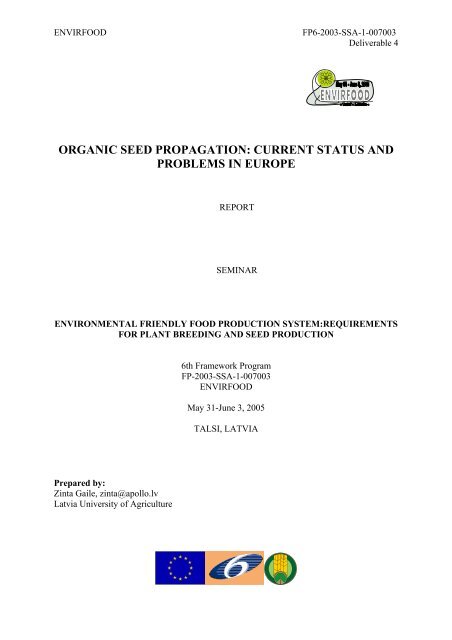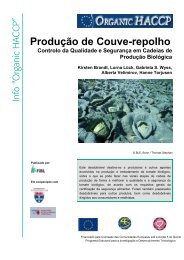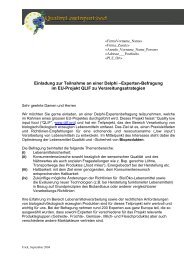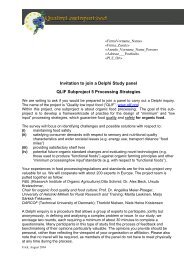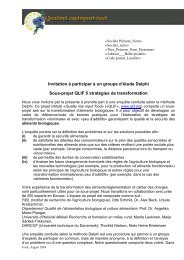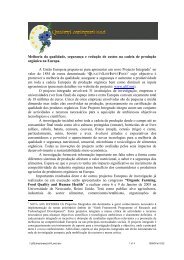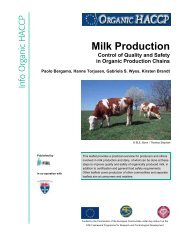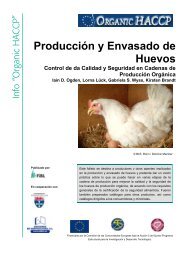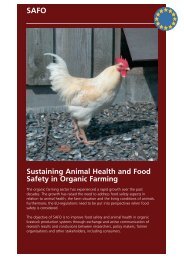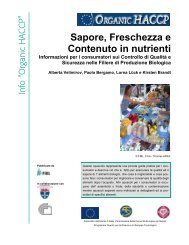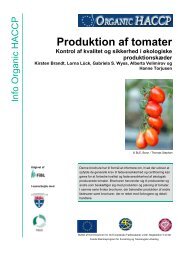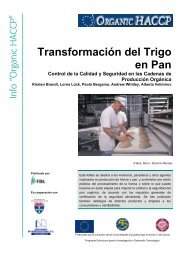ORGANIC SEED PROPAGATION: CURRENT STATUS AND ...
ORGANIC SEED PROPAGATION: CURRENT STATUS AND ...
ORGANIC SEED PROPAGATION: CURRENT STATUS AND ...
You also want an ePaper? Increase the reach of your titles
YUMPU automatically turns print PDFs into web optimized ePapers that Google loves.
ENVIRFOOD<br />
FP6-2003-SSA-1-007003<br />
Deliverable 4<br />
<strong>ORGANIC</strong> <strong>SEED</strong> <strong>PROPAGATION</strong>: <strong>CURRENT</strong> <strong>STATUS</strong> <strong>AND</strong><br />
PROBLEMS IN EUROPE<br />
REPORT<br />
SEMINAR<br />
ENVIRONMENTAL FRIENDLY FOOD PRODUCTION SYSTEM:REQUIREMENTS<br />
FOR PLANT BREEDING <strong>AND</strong> <strong>SEED</strong> PRODUCTION<br />
6th Framework Program<br />
FP-2003-SSA-1-007003<br />
ENVIRFOOD<br />
May 31-June 3, 2005<br />
TALSI, LATVIA<br />
Prepared by:<br />
Zinta Gaile, zinta@apollo.lv<br />
Latvia University of Agriculture
ENVIRFOOD<br />
FP6-2003-SSA-1-007003<br />
Deliverable 4<br />
According to EU Regulation 2092/91 for organic farming the organic sector had to<br />
close the organic chain using organic propagation material in Europe firstly by December 31,<br />
2000, but it was concluded that there was a general shortage of organic seed for most crops.<br />
For instance, A. Cook wrote in 1999 about UK: “…in UK … there is a general shortage of<br />
organic seed for most crops, but the main shortage must be defined as those crops that have<br />
no organically produced varieties commercially available. These crops include: oats, rye,<br />
triticale, parsnips, swedes, turnips and grasses and clovers. … survey has shown that there is a<br />
severe lack of organic seed that is commercially available to UK farmers and growers.<br />
Therefore, the extra three years given by the EU as an extension to the derogation for the use<br />
of conventional seed, should be used to stimulate and encourage organic seed production”.<br />
The next date for closing organic chain according to EU Regulation 2092/91 was by January<br />
1, 2004 and it demanded to develop efficient schemes to produce adequate quantities of<br />
organically produced seeds and planting materials. What does it means: organically produced<br />
seed (planting material)?<br />
Organic seed (planting material) is seed (planting material) produced by a crop that is<br />
planted and raised organically for at least one generation in the case of annual crops,<br />
and two generations in the case of biennial and perennial crops (Lammerts van Bueren,<br />
2002). It is naturally that organic seeds are obtained by purchasing conventional non-treated<br />
seeds (C1), which are grown organically for one season and then sold on to organic farmers as<br />
organic seeds (C2).<br />
E. Lammerts van Bueren (2002) nominated the main problems in organic seed<br />
production:<br />
1. Market problems are related to the limited area of organic agriculture and thus of the area<br />
of seed production per variety resulting in higher cost compared to conventional seed<br />
production. This will imply that the organic assortment of varieties per crop will be<br />
limited.<br />
2. Technical problems have to do with the lack of experience of the formal sector with<br />
organic seed production without chemical inputs.<br />
3. Problems with quality standards. The main problems are: disease and pest management,<br />
and weed control. Among the diseases the seed-born diseases require special attention.<br />
This also brings up questions and research needs related to seed quality.<br />
The expectation was that by 2004 for the most important crops there would be sufficient<br />
quantities of adequate quality organic seed and planting material. However, ongoing<br />
optimisation of organic seed production management will require to enlarge the cultivar<br />
assortment and to control the quality of organic seed and planting material.<br />
Until 2004 a lot of research was done on adapting and improving cultural practice for organic<br />
seed production. This implies developing adapted varieties for healthy seed production,<br />
developing protocols for seed health test, assessing threshold values, designing organic seed<br />
treatment, etc.<br />
I will give a few illustrations on research, done for optimising organic seed<br />
propagation in late 1990-ties and in the first years of the new millennium.<br />
B.Boelt, L.Deleruan, R.Gislum have dealt with different problems of organic legumes<br />
and grasses seed production in Denmark: mode of sowing, provision with nitrogen without<br />
artificial fertilisers, restriction of insects’ damage, etc. (Boelt et al., 2001; Deleuran, Boelt,<br />
2001; Boelt, Gislum, 2002; Boelt, 2003). In Denmark organic forage seed production has<br />
been established since 1992 and in 2000 organic grass and clover seed were produced on<br />
nearly 1000 ha. Production of one of the main constituents of forage mixtures, perennial<br />
ryegrass already in 2001 met the requirements set for organic seed in Denmark and this grass<br />
species and its seed was available for export. Of other grass species used in forage mixtures<br />
2
ENVIRFOOD<br />
FP6-2003-SSA-1-007003<br />
Deliverable 4<br />
only smooth stalked meadow grass is not organically produced, however the request is rather<br />
small. Among the clovers, there is now a production of organic seed of red clover that<br />
matches the demand however another main constituent of forage mixtures white clover is still<br />
in request. (Boelt et al, 2001). In 2003 in Denmark production of white clover (Trifolium<br />
repens L.) was still in request, too. Yields in organic white clover seed production are reduced<br />
by approximately 80 % compared to conventional production. Research activities did not<br />
solve up to now problem of clover seed weevils. A survey in organic clover seed fields have<br />
shown that weevils are found in all organic white clover fields, that the yield reduction from<br />
these range from the weevil larvae may be 12 – 77 %. Currently research activities are<br />
continued (Boelt, 2003).<br />
A new EU project on Seed Treatment for Organic Vegetable production (STOVE) is<br />
developed. With the current changes within organic farming regulations with regards to the<br />
use of organic and non-organic seeds, the issue of seed health has become critical for some<br />
organic vegetable producers. The development of new techniques for seed sanitation and the<br />
control of seed-borne diseases are now more urgent than ever and are of interest to both<br />
producers and users of organic vegetable seeds. Project started in 2003 and will end in 2005.<br />
In the project 2 new physical seed treatment methods will be tested. (www.stove-project.net)<br />
New Zealand’s experience suggests that organic vegetable seed production in covered<br />
area. Worldwide a lot of seed production (both conventional and organic) is now done in<br />
greenhouses because the environment and pollination can be controlled. It helps to keep seed<br />
free from fungal diseases, too (Walker, 2003).<br />
Prohibiting chemicals in organic crop production increases the risk of diseases for<br />
many crops, especially for biennials, which are exposed to infection during two subsequent<br />
seasons. A lot of research has been done to ensure seed health and healthy plant community<br />
development. Combination treatments were tried to develop using milder physical treatments<br />
with compounds of natural origin (essential oils, organic acids etc.). Groot et al. (2005) when<br />
testing 30 essential oils found that thyme oil exhibited the highest in vitro inhibiting activity<br />
against two bacterial and two fungal seed-borne pathogens of carrot. A.Borgen (2001) wrote<br />
that the most effective preventive method for control of seed borne diseases is to only<br />
introduce healthy seed into the system. It is of vital importance that the seeds purchased are<br />
free from diseases – this is not automatically the case even though it has been grown on the<br />
basis of disinfected plant material. Seed borne diseases occur equally often in conventional<br />
non-treated seed as in certified organic seed. The choice of resistant varieties is also an<br />
important component in the preventive strategy. No cereal variety is, however, completely<br />
resistant to all diseases - this would probably also be contrary to the wish of maintaining<br />
biodiversity. All things considered, it will be advantageous to use mixtures of several<br />
varieties, but this strategy is difficult to be implemented in the multiplication phase of the<br />
propagation, due to practical reasons as well as due to the degree of purity required by the<br />
rules for certification of seed. The cultivation conditions influence the occurrence of seed<br />
borne diseases, but we only have limited knowledge of this. It has been stated that row<br />
cropping may reduce the impact of some diseases, but the importance of this has not been<br />
determined (Borgen, 2001). Also early harvesting has an influence on some diseases (Olvång<br />
and Poulson, 2002).<br />
Different research projects and results from the whole world providing better<br />
availability of quality organic seed were documented in the “Proceedings of the First World<br />
Conference on Organic Seed” (Rome, Italy, 2004) (www.organicseedconf.org).<br />
Research results mainly show ways and possibilities to solve problems in organic seed<br />
sector both providing sufficient amounts and adequate seed quality.<br />
3
ENVIRFOOD<br />
FP6-2003-SSA-1-007003<br />
Deliverable 4<br />
Despite of these activities and existing EU regulations problems in organic seed use<br />
still exist even in European countries. They are specified by Groot et al. in 2005 and they still<br />
are very similar to those mentioned by E. Lammerts van Bueren in 2002:<br />
1. Organically produced propagation material is not available for all the crops or there are<br />
not appropriate varieties.<br />
2. To produce seeds under organic conditions and to obtain seeds of the same quality similar<br />
to conventionally produced seeds may often prove more difficult.<br />
3. For several crops organically produced seeds are more expensive and in practice farmers<br />
may choose the cheaper conventional seeds.<br />
4. Seeds may be obtained through farm-saved seeds or through exchange within the<br />
community, which are not always a certified organic production. Seed quality can be a<br />
serious problem (Groot et al, 2005).<br />
Despite of problems the field of organic production and the use of organic seeds are rapidly<br />
evolving. Due to this training of farmers, extension staff, researchers and policy makers needs<br />
attention. Education and comprehension can help to solve problems much easier. Several<br />
institutions such as IFOAM (International Federation of Organic Agriculture movements) and<br />
ISTA (International Seed Testing Association) can contribute to this need. For instance, apart<br />
from pioneering research on organic seeds, the Wagening University and Research Centre<br />
(the Netherlands) also provides courses both on seed technology and organic farming.<br />
(http://www.seedcentre.nl) (Groot et al., 2005)<br />
The expectation was in 2001, as mentioned above, that by 2004 for the most important<br />
crops there will be sufficient quantities of organic seed and planting material of adequate<br />
quality. In the course of time it became clear that sufficient quantities of organic seed and<br />
propagation material would not be available for all crops and methods of cultivation on<br />
January 1, 2004. On August 14, 2003 an EC Regulation was adopted (1452/2003) under<br />
which exemptions are permitted under certain conditions and member states are obliged to<br />
implement it as from January 1, 2004. In order to grant exemptions, information must be<br />
available concerning the availability of organic propagating material. By this Regulation<br />
information regarding organic propagating material availability must be made transparent by<br />
setting up an electronic database containing information on availability.<br />
Now a year has passed under this EC Regulation. Current situation in European<br />
countries in organic seed sector was investigated, both searching information in web pages as<br />
well as contacting responsible persons by e-mails shown mainly in pages of organic seed<br />
databases. Answers to following questions were sought:<br />
1. Do you produce enough double certified organic seed in your country or do you import it?<br />
2. Do farmers widely use Organic seed database? Whose responsibility is to comprise this<br />
database?<br />
3. Are there some field crops for which derogation to use conventional seed is allowed?<br />
What is system like and to whom do farmers have to apply for derogation?<br />
4. Is it allowed to use so called 'home saved' seed? Do farmers test quality of such seed?<br />
5. What are the main problems for seed lots' rejection: variety purity, diseases, germination<br />
etc.?<br />
6. How do you organize organic seed production: is it organic from initial stages (starting<br />
with breeder′s seed) or only one or two generations are grown under organic conditions?<br />
In order to help farmers and companies to obtain organically produced seed Member<br />
states were demanded to establish an online database, where suppliers of seed can register<br />
seed and seed potatoes, produced by the organic production method, which they want to<br />
put in the market. If there is no seed available of the species which organic farmer wants to<br />
4
ENVIRFOOD<br />
FP6-2003-SSA-1-007003<br />
Deliverable 4<br />
grow, or if there is no appropriate variety available, the farmer can ask the inspection body for<br />
a derogation to use non-organically produced seed. With regards to vegetative propagating<br />
material, other than seed potatoes, this falls under the discretion of the member states, until<br />
appropriate criteria can be adopted at Community level. From the following web page<br />
www.europa.eu.int/comm/agriculture/qual/organic/seeds/index_en.htm it is possible to get to<br />
links to databases for organic seed in Member states. 15 countries are shown in this page on<br />
April 1, 2005, even if broadening of EU occurred on May 1, 2004. Countries mentioned in<br />
web page are as follows: Belgium, Denmark, Germany, Greece, France, Italy, Luxemburg,<br />
the Netherlands, Finland, Sweden, United Kingdom (links to web sites are provided) Austria<br />
(link to web sites is provided, but it is not possible to open the page), Spain, Ireland, Portugal<br />
(without links to web sites). Mainly databases and web pages are made in countries’<br />
languages and it is not possible to use them for people not speaking and reading in every<br />
European language. B.Boelt in 2003 wrote that it is in project that after some years the<br />
availability of organic seed will be evaluated, and then the European Commission will<br />
consider establishing a common European database. Then wide information will be available<br />
for every coterie.<br />
And now I will try to answer the questions mentioned above. I am very thankful to<br />
people, providing me with information through the personal communication (see names at the<br />
end of the paper). Without their responsiveness it could not be possible to write this paper.<br />
Organic seed database availability and use in European countries, responsible body to<br />
comprise this database.<br />
OrganicXseeds is an organic seed database for Europe www.organicXseeds.com: UK,<br />
Germany, Luxemburg, Belgium and Switzerland. The organisation responsible for the<br />
database is FIBL (Research Institute of Organic Agriculture) in Switzerland, in cooperation<br />
with SA (Soil Association) and NIAB in England, AIAB in Italy, the LBI (Lois Bolk<br />
Institute) and the Stichting Zaadgoed in Holland and the German working group ALOG. The<br />
organicXseeds database allows easy search of organic seeds or in case of not good offer it<br />
gives the possibility to farmers directly call for derogation via a web blank form.<br />
Database for United Kingdom derives from www.organicXseeds.com – since 2001,<br />
administrated by Soil Association (SA) of UK. SA entered all the data to database for UK<br />
companies. For farmers who lack access to Internet SA publishes as well a printed organic<br />
seed list. At the www.organicXseeds.co.uk it is possible to find available seeds on 47 pages:<br />
species, varieties, contact addresses, where seed is possible to buy. In addition a lot of<br />
company databases on organic seed availability in UK are accessible in the web, for instance,<br />
MAS Seed Specialist ‘Aubergine to carrot organic vegetables’ in<br />
www.meadowmania..co.uk/default.cmf/loadindex.138. Book on seed production and English<br />
website on biodiversity is located on www.kokopelli.asso.fr/en, etc.<br />
Database located at www.iol.ie/~organic/seeds/seeds.html gives information on organic seed<br />
availability in different countries and by different seed suppliers: Ireland, UK, France,<br />
Germany, Holland, Italy, Israel, Switzerland, and North America.<br />
In Ireland a database has been developed for users showing the seed and vegetative<br />
propagation material that is registered and available here. The database is available on the<br />
website of the Department of Agriculture and Food:<br />
www.agriculture.gov.ie/index.jsp?file=organics/rules/rules.xml.<br />
The Netherlands. The database is to be set up by the Netherlands Inspection Service for<br />
Horticulture by order of the Ministry of Agriculture, Nature and Food Quality (LNV)<br />
www.biodatabase.nl. Easy accessible and there is an English version, too.<br />
5
ENVIRFOOD<br />
FP6-2003-SSA-1-007003<br />
Deliverable 4<br />
In Sweden it is the Swedish Board of Agriculture responsible for the database of available<br />
organic seed. The address is www.sjv.se/ekoutsade/Tillgång och generella<br />
dispenser/Databasen.<br />
In Denmark the database is called “The database for organic seed and vegetative propagating<br />
material”, in short: Den okologiske frodatabase (the organic seed database). The database is<br />
available in the following homepages: www.pdir.dk/okofrodatabasen and<br />
www.landscentret.dk/oekoudsaed. The database was established at the beginning of 2004 in<br />
cooperation with Landscentret (an organization for Danish farmers). The registration in the<br />
database is regulated in an administrative order No. 1089 from December 12, 2003. This<br />
administrative order contains necessary rules. The seed suppliers can register the species and<br />
the amounts they wish to sell via a login to the database. Organic farmers are obliged to use<br />
organically produced seed, seed potatoes or vegetative propagating material, if the required<br />
species is registered in the database. The seed suppliers must record immediately, when a<br />
species is not longer available in the market and in certain period they must update the<br />
database on a weekly basis. The database is divided into 3 main groups: agricultural crops,<br />
vegetable crops, and vegetative propagating material. In Denmark the database includes all<br />
registered vegetative propagating material, and not only seed potatoes.<br />
Norway is not a member state of EU and Norway does not have database for organic seed.<br />
Although, Mattilsynet (the Norwegian Food Safety Authority, a governmental body under the<br />
Ministry of Agriculture and Food) has a list in web page:<br />
http://www.mattilsynet.no/multimedia/archive/00011/Liste__kologisk_pro_11963a.pdf (in<br />
Norwegian language). Mattilsynet is responsible for this list.<br />
In Austria up to date ‘database is simply pdf-files which do not at all serve the purpose of a<br />
well working database’ (S.Eigenschink, March, 2005, personal communication). It is AGES<br />
(Austrian Agency for Health and Food Safety) responsibility to comprise the database:<br />
www.ages.at<br />
Database in Finland is made and updated by Plant Production Inspection Centre. Telephone:<br />
358 2 7605 6259; Fax: 358 2 7605 6220.<br />
Asking about real practical use of organic seed databases I got the following<br />
answers:<br />
1. Database is widely used by farmers - Finland, Switzerland.<br />
2. Database is widely used by farmers and by advisors for their clients –Denmark, Germany.<br />
3. Database is mainly used for seeking information on seed availability, but not very usually<br />
for application for derogation. Explanation is that database is working only since May 17,<br />
2004 – Belgium.<br />
4. Not all the farmers have possibility to use online database. They got information through<br />
advisors or farmers’ papers - Sweden.<br />
5. Information on database use by farmers is not available – Norway.<br />
6. Austrian case is described above in the same page.<br />
Very important is the question about amount of organic seed production in European<br />
countries. If there are not seed produced, database should be empty and cannot help. Answers<br />
to the question “Do you produce enough double certified organic seed in your country or<br />
do you import it?” were dependent from a specific country.<br />
In Germany it depends on the crops and varieties. There is a considerably high production on<br />
vegetable seeds, sufficient amount of organic field crops’ seeds. At the same time a lot of<br />
vegetable seeds originates from the Netherlands.<br />
6
ENVIRFOOD<br />
FP6-2003-SSA-1-007003<br />
Deliverable 4<br />
Switzerland recognizes that they are not a breeders’ nation anymore. They have an organic<br />
(as well as conventional) seed production nearly only for main field crops: wheat, rye, barley,<br />
spelt, Triticum monococcum and potatoes there are Swiss certified seed production in farmers<br />
cooperatives providing nearly 100 % of organic seed supply. Price difference from<br />
conventional is moderate. Seed for other field crops and all the vegetable crops’ seed are<br />
imported. Price difference from conventional is high to very high.<br />
Sweden is almost self-sufficient considering organic seed of wheat, winter rye, triticale, pea<br />
and broad bean. They are self-sufficient in some extent for oat, barley, potatoes, winter rape,<br />
timothy, meadow fescue, alsike clover and red clover. Considering horticultural crops there is<br />
enough seeds on the market, but most of them are imported.<br />
In Denmark there is sufficient Danish produced seeds of most species that is possible to<br />
produce in Denmark. But especially vegetable seeds are not produced organic in Denmark.<br />
They also have problems producing sufficient amounts of white clover, lupine, and pea. But –<br />
taking into account very wide research work performed in Denmark (I have mentioned several<br />
examples above in this paper) it is believable that Denmark will solve their deficiency<br />
problems in near future.<br />
In Norway double certified organic seed is not produced in sufficient level. They import<br />
some grass seed.<br />
In Finland situation is good with reference to some species – oat, barley, spring wheat, spring<br />
rape, red clover and timothy. Organic seed of other species are not produced sufficiently.<br />
There are 6 Belgium seed suppliers and 1 Dutch seed supplier registered now in official web<br />
site of Belgium www.organicXseeds.be. Agriculture in Belgium depends a lot from imports<br />
when speaking about conventional seed supply as well as about organic. For instance,<br />
vegetable seeds are imported from the Netherlands, maize – from France, grass and clover<br />
seeds from Denmark and the Netherlands.<br />
Not all demand of organic seed is self-assured in Austria, too. For instance, they import<br />
vegetable seeds; not all wanted varieties are propagated in Austria, too.<br />
There are not legal problems to use so-called ‘home saved seed’ in organic<br />
farming. It is allowed in all 8 countries, replying to my questions, to use home saved seed.<br />
Farmers are stimulated to test quality of such seed, but mainly there are not official data about<br />
the samples tested, and officials are of the opinion that farmers do not test home saved seed<br />
very usually or that testing mainly depends from specific farmer (Sweden, Denmark,<br />
Norway, Finland, Austria). Chris Dybvad from Norway remarks that it is illegal to market<br />
seed if it is not a ‘certified seed’.<br />
Kris De Rider told that for home saved seed Belgium applies the EU Regulation 1768/95 and<br />
they have as well a national legislation about this subject, too. EU Regulations do not exclude<br />
use of home saved seed.<br />
Klaus-Peter Wilbous reported that it is allowed to use home saved seed in Germany, but<br />
farmers are not allowed to sell or change it to other farmers, but only use it on their own farm.<br />
This issue plays a certain role in cereals and a few other crops, but not in vegetables. Only<br />
few of the farmers who are saving their own seed do seed quality test on a regular basis (e.g.<br />
bio-dynamic farmers).<br />
Andreas Thommen from FIBL told that home saved seed is very rarely used in Switzerland<br />
neither by conventional nor organic farmers. Most of them use official certified seed. But the<br />
organic guidelines are not an obstacle to use home saved seed. If an organic farmer produces<br />
his own seed, he fulfils the seed production guidelines and therefore his seeds would be<br />
organic.<br />
7
ENVIRFOOD<br />
FP6-2003-SSA-1-007003<br />
Deliverable 4<br />
Describing process of organic seed production mainly all the countries answered<br />
that organic seeds are per definition and in accordance with EU Regulations seeds, which had<br />
be grown for annual crops one season on organic farmland and for biannual or perennial crops<br />
for two seasons on organic farmland (Belgium, Sweden, Danmark, Norway, Finland,<br />
Austria).<br />
Switzerland specifies that their breeders or basic seed producers produce organic basic seed or<br />
F1-generation of certain varieties. Since the demanded varieties change quite fast, it is often<br />
not possible to produce several generations under organic conditions and therefore the use of<br />
non-organic basic seed is possible. The organic seed production cooperatives ask in this case<br />
for derogation, since they want to have the right to sell the remaining after triage or failed<br />
seed lots as organic food.<br />
In Germany there are breeders who do breeding and multiplication of seed under organic<br />
conditions like Bingheimer Saatgut AG (www.oekoseeds.de) or Dr. Karl Josef Müller<br />
(www.darzau.de), but most of seeds are conventionally bred and multiplied for 1 or 2<br />
generations under organic conditions.<br />
Seed quality is issue of very high importance. Organic crop production may demand<br />
even higher quality propagation material compared to conventional farming. Farmers should<br />
rely on the quality of the seeds they are using. But light-minded farmers attention to quality<br />
testing is described above. Preventing measures using chemicals are prohibited and<br />
competition with weeds requires high vigour planting material. Moreover, for organic<br />
farmers, seed health and the absence of genetically modified contamination is also very<br />
important. Some tools for obtaining adequate quality seed are described already above in the<br />
section about research importance for organic seed provision. There some additional<br />
examples will be shown. Seed priming – primed seeds germinate faster in the field and this<br />
may contribute to an improved competition with weeds. Research shows that plants derived<br />
from primed seeds show a faster initial growth and an earlier ground cover (Groot et al.,<br />
2005). New seed sorting technologies – a technique has been developed to sort seeds on the<br />
basis of their level of chlorophyll fluorescence (CF). For instance, the most mature cabbage<br />
seeds, with lowest level of CF, had highest percentage germination, more uniform and higher<br />
speed of germination and lower amount of infected seedlings. For barley seeds, a relationship<br />
was established between the strength of the CF signal and the level of contamination with<br />
Fusarium spp. Seeds from the fraction with the highest of signals were always most heavily<br />
infected (Groot et al., 2005). I would like to stress that research in European countries are<br />
solving a lot of problems in different aspects of organic seed production and Baltic countries<br />
should follow this good example and investigate problems under their specific agroecological<br />
conditions.<br />
Despite effort of researchers as well as producers some lots of organic seed are<br />
rejected like in conventional seed production. What are the main problems of seed lots’<br />
rejection in European countries?<br />
Germany. In field inspection the main problem are diseases. Seed health in laboratory is<br />
tested by cold test and threshold of spores. But the test is not legally obliged.<br />
Switzerland. Seed production cooperatives are provided with very high quality basic seed,<br />
sometimes in organic quality, often in non-organic quality. Therefore there is not so big risk<br />
of diseases. They had occasionally problems with seed borne diseases like Tilletia in spelt or<br />
late blight in potatoes. Sometimes these lots were reduced to non-organic seed and could be<br />
treated then with chemical seed treatments. A study of how many lots are rejected initiated by<br />
the EU organic revision project lead by IFOAM will be done in summer 2005.<br />
8
ENVIRFOOD<br />
FP6-2003-SSA-1-007003<br />
Deliverable 4<br />
Sweden. The most common problem for seed lots’ rejection is germination and the second<br />
common is variety purity, and the third common is seed moisture. More information about<br />
seed quality in different crops in Sweden could be got contacting Swedish Seed Testing and<br />
Certification Institute (www.utsadeskontrollen.se).<br />
Denmark. There can be different reasons depending on species, but the most common are<br />
seed health and germination.<br />
About 5 – 10 % of the seed lots are rejected in Belgium. During the field inspection the main<br />
reason is lack of variety purity, but in laboratory test – germination.<br />
The last question clarified was about derogation system in European countries<br />
for the cases when organic seed supply is insufficient.<br />
The EEC Regulation No. 2092/91 states that organic seeds shall be used where available.<br />
However, it allows non-organic seed to be used where no suitable/appropriate organic<br />
alternative is available. The EC Regulation No. 1452/2003 does not allow treated seed to be<br />
used any longer (as of January 1, 2004). There are also no grounds for a derogation to use<br />
non-organic seed on the grounds of seed quality if the variety a user wants to use is registered<br />
in the database. Availability of the seed should be transparent. Transparency should be<br />
provided by electronic databases, which would contain information about availability of seed<br />
(see above section about Organic seed databases). Derogation system and derogations issued<br />
during 2004 vary from country to country.<br />
United Kingdom. Application to use non-organic seed in line with European Council<br />
Regulation (EEC) No. 2092/91 and European Commission Regulation (EC) No. 1452/2003<br />
has to be addressed to Certification body. Application form that should be used for single<br />
varieties of seed, for grass & forage mixes and for seed potatoes can be found in database web<br />
page. Certification body needs the reason(s) for wanting to use non-organic seed before any<br />
purchases. Where grass& forage mixes are used containing 50 % or more organic seed, details<br />
of the non-organic seed within the mix can be submitted to certification body after purchase.<br />
However derogation must be obtained prior to your next inspection.<br />
Single seed varieties: if variety that you require is not available as organic seed, and<br />
alternative varieties of the same crop are not suitable your certification body will consider<br />
your request to use non-organic seed. The justification must be from the following list:<br />
1. No variety of the species which I want to use are registered in the UK organic seed<br />
database;<br />
2. The seed supplier is unable to deliver the seed or seed potato before sowing or<br />
planting despite ordering the seed or seed potato in reasonable time;<br />
3. The variety which I want to use is not registered in the database and I can demonstrate<br />
that none of the registered alternatives of the same species are appropriate for my<br />
production (you will need to indicate the reason they are not appropriate);<br />
4. For research purposes;<br />
5. To test in small-scale field trials;<br />
6. For variety conservation purposes;<br />
7. The seed is part of a grass or forage mix containing at least 50 % organic seed.<br />
From 31 December 2004, DEFRA (Department for Environment, Food and Rural<br />
Affairs, UK) will require organic farmers to sow organic grass and forage seed mixes<br />
with a minimum organic content of 60 per cent by weight. This requirement will stand<br />
until 31 December 2006 (Centre for organic seed information (COSI:<br />
www.cosi.org.uk; www.soilassociation.org))<br />
9
ENVIRFOOD<br />
FP6-2003-SSA-1-007003<br />
Deliverable 4<br />
Potatoes – seed potatoes must be sourced organically. Approval for non-organic varieties may<br />
be given in exceptional circumstances. Certification body has to be contacted to discuss the<br />
requirements. Use of organic seed potatoes will become mandatory in 2005.<br />
The government is not in favour of the percentage approach. The rule is difficult to fit within<br />
the European legal framework. A percentage rule for individual growers was discussed but<br />
eventually rejected. This particular subject is likely to be part of the European evaluation in<br />
2005.<br />
According to the Soil Association, the present use of organic seed in vegetable cultures (with<br />
the exception of Brassica species) is as much as 50 to 75 %.<br />
The database is being discussed in so-called seed working groups. Reports are to be found at<br />
www.cosy.org.uk<br />
In Ireland, three private inspection bodies (i.e. Demeter Standards Ltd, Irish Organic<br />
Farmers and Growers Association and the Organic Trust Limited) give the required formal<br />
permission to the producer to use seed and vegetative propagation material that has not been<br />
produced by the organic production method. Producers should ensure that the prior approval<br />
of the inspection body is obtained before using such seeds. (Source:<br />
www.iol.ie/~organic/seeds/seeds.html)<br />
In the Netherlands from January to June 2004, 1392 derogations were given for 2093<br />
varieties. This includes derogations for research/field trials done by seed companies. Seed<br />
propagators more often asked for derogation than individual farmers did it. In order to<br />
encourage the use of organic propagation material as much as possible in organic agriculture<br />
and to make exemption system as easy as possible, crops in the Netherlands are divided into<br />
three groups:<br />
1. crops for which no exemption will be granted because there is sufficient organic seed<br />
available (for instance, potato, barley, oats, wheat etc.).<br />
2. crops thereby exemption is possible because although propagating material is<br />
available, it is not in sufficient quantities or for all cultivation methods (for instance,<br />
timothy, field pea, ryegrass etc.).<br />
3. crops for which a general exemption is granted because no organic propagating<br />
material is available (for instance, asparagus, sweet corn, chicory, caraway,<br />
ornamental crops and trees, hemp etc.). (www.biodatabase.nl)<br />
Main reasons for derogation were:<br />
• no organic seed available of the variety asked;<br />
• variety is not appropriate for soil type;<br />
• variety doesn’t have the desired resistance, this is especially a problem with lettuce;<br />
• the market asks for another variety.<br />
For crops on the national annex in principal no derogation is possible (see above: group 1),<br />
but a few exceptions where made by the government after consulting with the national control<br />
body (Skal). For instance:<br />
• there was no potato variety available which is suitable for the production of fries;<br />
• lucerne seed was sold out after a while;<br />
• durum wheat for the production of pasta was not available;<br />
• rye was on the annex but there was no summer-rye available; now only winter rye is<br />
on the annex.<br />
Main issues of organic farmers:<br />
• The implementation of EC regulations differs between countries, leading to unfair<br />
competition.<br />
10
ENVIRFOOD<br />
FP6-2003-SSA-1-007003<br />
Deliverable 4<br />
• For organic growers, the obligation to use organically produced seed limits their<br />
choice of crops; because the market for organic seeds is small, seed companies<br />
produce organic seed for only few cultivars and crop varieties.<br />
• Every year, new cultivars are brought onto the market (for example, Bremia resistant<br />
lettuce varieties), but organic seed for these varieties is not immediately available.<br />
• It is difficult for organic growers to meet market demands for special vegetable<br />
varieties (with different tastes, shapes, colours) if organic seed or propagating material<br />
for these varieties is not available. Among others, this is a problem for growers of<br />
greenhouse vegetables such as tomatoes and sweet peppers.<br />
• The price of organically produced seed is unnecessarily high, partly due to the limited<br />
number of market players (seed companies).<br />
• The higher price of organically produced seed cannot (yet) be passed on to the<br />
consumers therefore organic growers have to sacrifice part of their profits.<br />
• Farmers who do not use organic seed are able to produce their crops at lower costs,<br />
leading to unfair competition.<br />
Main issues of seed companies:<br />
• Organic seed production is difficult, pioneering work. For example, a seed company<br />
trying to meet market demands for 200 metric tonnes of spring wheat seed had to<br />
double its production area to produce 350 tonnes: the extra production is necessary as<br />
part of the harvest is of inferior quality and another part may be rejected because of<br />
root rot.<br />
• It is too easy for farmers to obtain derogations, leaving seed companies with unsold<br />
stock.<br />
• To avoid the use of (expensive) organic seed, farmers may misuse the database, and<br />
this could lead to great profit losses for seed producers. For example, when the Bejo<br />
seed company registered on the database an onion variety that used to be a non-treated<br />
seed variety popular with organic growers, many farmers tried to avoid the obligation<br />
to purchase the more expensive organic seed by switching to other onion varieties, for<br />
which organic seeds were not available.<br />
• There is a serious lack of organic seed producers. Seed companies should be<br />
stimulated to participate.<br />
• A level playing field for farmers is necessary.<br />
The Netherlands plans for 2005. The Netherlands will introduce a new National Annex<br />
of species and varieties excluded from the scope of derogation. Early November 2004, expert<br />
meetings were held to determine which crops should be listed on the 2005 Annex. Crops were<br />
tested by the following criteria:<br />
• Are the main varieties of the species available?<br />
• Are suitable varieties available to cover all growing seasons and possible uses? If not,<br />
the Dutch government wishes to know what is needed to improve coverage for 2006<br />
and/or later years.<br />
• Is a division into subspecies or sub-varieties advisable?<br />
• Are some of the varieties interchangeable?<br />
• Are there at least two seed suppliers for this crop?<br />
• In the case of “small” crops (for which total planting area is small): Is suitable organic<br />
seed available from at least one supplier? And have there been derogation requests for<br />
this species in 2005?<br />
Percentage rule<br />
11
ENVIRFOOD<br />
FP6-2003-SSA-1-007003<br />
Deliverable 4<br />
The sector has requested the government to consider the introduction of a so-called<br />
percentage rule. In this approach, a specified percentage (25 %) of the seed used should be<br />
organic. The percentage rule should apply to crops for which organic seed supplies are too<br />
limited to list them on the Annex, and for which supplies are not expected to increase because<br />
demand will remain low; partly due to high seed prices and unfair competition. With this<br />
percentage rule farmers want to show their commitment to the seed companies. The<br />
percentage should be raised in the following years (50, 75, 100 %) if the supply increases and<br />
other countries follow this example. At this moment, it is yet unclear whether a percentage<br />
rule will be implemented, because the government is concerned about legal implications. A<br />
pilot project with a limited number of crops may be initiated.<br />
(Source: Maaike Raaijmakers, the Netherlands, raaijmakers@biologica.nl)<br />
Germany. There are two categories of derogation according to Regulation 1452/2003:<br />
general derogation where no or small amount of seed is on the market and the single<br />
derogation where the good deal of the needed seed is on the market. For a general derogation<br />
grower can download a confirmation from the official database www.organicXseeds.de,<br />
confirming that there is no seed of that variety listed in the on-line database. With regards to<br />
single derogation the grower submits the derogation request via organicXseeds to his<br />
inspection body that decides upon this request. The most common reasons for derogation<br />
requests are the unsuitability or unavailability of a crop variety. Some seed producers have<br />
indicated that the demand for organic seed has increased in 2004 compared to 2003, but<br />
statistics are not yet available. Organic horticulturists complain that organic seed is not<br />
available for some resistant varieties: this is especially the case with lettuce.<br />
The classification into crop categories will be revised based on an evaluation by the expert<br />
groups. There will not be a national annex for 2005; however, there is an ongoing discussion<br />
about a possible list of crops, which should be excluded from the scope of derogation because<br />
adequate amounts of seed are available.<br />
Many crops on this year’s general derogation list will be registered on the organic seed<br />
database next year. This should lead to an increase in the use of organic seed.<br />
Specific concerns:<br />
- Only private rules;<br />
- The database is very small;<br />
- Any changes have to be agreed upon by all sixteen German states;<br />
- The people deciding about the organic seed database do not have an organic-agricultural<br />
background.<br />
Fleuren company, a Dutch producer of organic apple trees selling most of its trees in<br />
Germany, reports that German growers request written confirmations when required varieties<br />
are not available. This indicates that the derogation process is closely monitored.<br />
(Source: M.Raaijmakers information from FIBL - Forschungsinstitut für biologischen<br />
Landbau; Vitalis, Fleuren (seed companies and Klaus-Peter Wilbous, Klauspeter.wilbous@fibl.org)<br />
Switzerland established the 3-step system, which reflects the EU system. The great<br />
difference is that we did not only classify whole species, but divided the species into variety<br />
groups (like winter wheat, first quality etc., cauliflower for under glass production etc.).<br />
Annex 1 – there is sufficient offer of organic seed and use of it is obligatory. Derogation can<br />
be earned only for varieties’ trials, conservation purposes etc. Request must be<br />
submitted in writing.<br />
Appropriate 2 – available at least one “top” variety, adapted for professional use id est.<br />
“appropriate” variety. Reasons for derogation as above, there can be added other<br />
12
ENVIRFOOD<br />
FP6-2003-SSA-1-007003<br />
Deliverable 4<br />
reasons, based on agronomic or economic evidence. Request must be submitted in<br />
writing.<br />
General derogation – no variety adapted for professional use. From organicXseeds<br />
downloaded confirmation is sufficient, no request in writing is demanded.<br />
Nearly all of arable crops are on the step one or two, which means that farmers need<br />
derogation for the use of non-organic seeds. The following four commissions of the labelorganisation<br />
BIO SUISSE are doing classification: arable and fodder crops, vegetables,<br />
ornamentals, herbs and spices. These commissions are composed of advisors, researchers and<br />
mainly of organic farmers. This is a certain guarantee that the classification is well accepted<br />
by farmers.<br />
Special regulations have been set up for mixtures of grass seeds. Since not all desired<br />
components of grass and clover are available in organic quality, it is asked for a minimal<br />
amount of organic seeds of 30 % on mixtures. These 30 % organic seeds may be used without<br />
any derogation. Mixtures with less than 30 % (next year 40 %) organic components need<br />
derogation.<br />
With vegetables Switzerland has more problems, because there the quality standards<br />
of the whole trade are very tough and some breeders who dominate certain species are not<br />
willing to produce organic seeds or giving licences to organic seed producers.<br />
All organic farmers’ addresses are registered on organicXseeds. All farmers have access to<br />
the derogation tools with a personal password. In Switzerland the derogations are handled by<br />
FIBL Institute. In the other organicXseed-countries (U.K., Germany, Luxemburg, Belgium),<br />
the private control bodies are responsible to give derogations.<br />
Andreas Thommen from FIBL is of the opinion that the Swiss solution has the advantage:<br />
FiBL as an independent institute has to decide about calls for derogations. To let the control<br />
bodies decide means, private bodies, which are in concurrence with one another, may give<br />
derogations to their own customers, from which they depend. This may lead to too much<br />
allowed derogations. Andreas Thommen would strongly recommend the Swiss solution,<br />
which is much more fair and just. (Source: Andreas Thommen, FIBL,<br />
andreas.thommen@fibl.org).<br />
In Sweden for all crops that are not mentioned in Annex 1 there is a general<br />
derogation e.g. for flax, sugar beet and buckwheat. The farmers have to apply for derogations<br />
to the Swedish Board of Agriculture. If there is missing an essential variety of a crop (e.g. for<br />
a region, for market purpose, for resistance to diseases) or the farmer wants to test a new<br />
variety in a small scale field trial the Board is authorizing derogations (when possible a<br />
general and otherwise individuals). (Source: Gunilla Idestrom, information@sjv.se)<br />
Juha Kieksi (juha.kieksi@mmm.fi) told that in Finland farmers have to apply for<br />
derogation to local governmental organization according to Regulation 1452/2003.<br />
In Norway farmers are allowed to use non-organic seed if they can’t get the variety<br />
they need. This seed has to be non-treated (but cedomon treatment is allowed) and the farmers<br />
must get a statement from the seed merchants that they are not able to deliver organic seed of<br />
this variety. This system applies to all the crops. This system is found to be the most suitable<br />
as long as the organic sector is quite small and due to the latter the supply of organic seed<br />
from different varieties is rather limited. (Source: Chris Dybvad, Debio:<br />
chris.dybvad@debio.no)<br />
Denmark has adopted a stringent derogation system and therefore considers a<br />
national annex unnecessary. For example, since Denmark is self-sufficient in cereals, farmers<br />
will never get derogations for these crops. Also for grass seeds and potatoes Denmark has ‘in<br />
fact’ a national annex. The Danish Plant Directory issues derogations, and this institution has<br />
made an annual report on the derogations issued in Denmark in 2004:<br />
13
ENVIRFOOD<br />
FP6-2003-SSA-1-007003<br />
Deliverable 4<br />
www.pdir.dk/files/filer/oekologi/virk/froedatabase/report_2004_seed.pdf. The possibility of<br />
getting derogation is explained in this survey, too.<br />
The problem with seeds for vegetable crops is that most of them are not tested. For instance,<br />
ten varieties of organic carrot seed are imported, but only two varieties are tested in Denmark.<br />
Farmers refuse to use organic seed unless it is tested on quality and vigour in Denmark itself.<br />
The fact that the seeds are thoroughly tested in the country of origin is apparently not<br />
sufficient. (Source: The Danish Ministry of Food, Agriculture and Fisheries, Inger Bertelsen,<br />
INB@landscentret.dk and Report 2004 on Danish authorisations to use…, January, 2005).<br />
In Belgium all the species are devided into two levels. The species that belong to<br />
level 1, are not entitled to authorisations pursuant to the derogation referred to in paragraph 1<br />
unless it is justified by one of the purposes referred to in Article 5(1)(d) of EC Regulation No<br />
1452/2003 (for instance, Allium sativum L., Brassica, diverse species, Cichorium intybus L.,<br />
Cichorium intybus L., Cucumis sativus L., Portulaca oleracea L., etc.). All crop groups that<br />
are not put on level 1 belong to level 2, which means that article 5 of EC Regulation No<br />
1452/2003 of 14 August 2003 has to be applied. To apply for derogation a farmer can use two<br />
options. He can log in on the Belgian database using his password and user name. On this<br />
personal site he can search for his wanted variety. When the variety, that he wants, belongs to<br />
a crop group on level 2 he may ask for derogation by using the derogation form on the<br />
database. He can also contact his inspection body that provides him with a derogation form.<br />
Finally his inspection body answers to his request after having analysed the data given by the<br />
farmer and the data available on the database (Source: Kris De Rider, Ministerie van de<br />
Vlaamse Gemeenschap, kris.deridder@ewbl.vlaaderen.be).<br />
The organic sector in Flanders has come to the conclusion that the present derogation<br />
system is failing. Although the system requires growers to motivate their requests, the fact is<br />
that derogation is always possible if the requested variety is not registered on the database.<br />
The result is that it is too easy to obtain derogation. Therefore, the Flemish sector has<br />
proposed the introduction of a percentage rule. For example, for onion and carrot 20 % of the<br />
seed used should be organic; for species that were close to making the annex, 50 %; and for<br />
crops with adequate amounts of seed available (i.e., crops listed on the national annex), 100<br />
%. In addition, the sector has proposed a general derogation for all crops with non-existing<br />
organic seed supplies. The Flemish government backs the percentage approach, but the<br />
complication is that the Walloon provinces should also agree. At this moment it is yet unclear<br />
what will happen in 2005; the Flemish and Walloon governments are presently discussing the<br />
matter.<br />
Other specific issues:<br />
Supplies of organic seed for cereal crops are far too limited. Flemish seed companies<br />
apparently are not interested to produce these seeds. (Source: M.Raaijmakers information<br />
from PCBT - Interprovinciaal proefcentrum voor de biologische teelt).<br />
In Austria, inspection bodies grant derogations in accordance with the EC Regulation<br />
No 1452/2003. Sabine Eigenschink is of the opinion that the system does not work very well<br />
yet. (Source: Sabine Eigenschink, Austria Bio Garantie, S.Eigenschink@abg.at)<br />
In France, a simple, accessible database offering ample supplies of organic seed<br />
varieties has been in operation since January 2004. Increased attention for the subject and the<br />
introduction of the derogation system has greatly enhanced the use of organic seed if<br />
compared to 2003. More than 10000 derogation requests were submitted in the first six<br />
months of 2004. A point of concern is that certification bodies often have difficulties to assess<br />
whether requests are justified.<br />
French plans for 2005. French seed companies would like to see the following crops<br />
listed on a national annex (id est. organic seed use must be obligatory): maize, potato,<br />
14
ENVIRFOOD<br />
FP6-2003-SSA-1-007003<br />
Deliverable 4<br />
cucumber, shallot, spinach, lettuce and strawberry. As for maize, more than half of the supply<br />
is unsold stock. Seed companies threaten to cut off investments in organic seed production if<br />
their supplies are not sold.<br />
Farmers are worrying about the future of old, native varieties, which are still grown all<br />
over France. They fear that the cultivation of these varieties will become restricted in the<br />
future, as they are not listed on the database. Until this is clarified, they do not support the<br />
introduction of an annex.<br />
Expert meetings were held at the beginning of November 2004. As it turned out,<br />
farmers’ support for a national annex was far from overwhelming. The government therefore<br />
proposed a more stringent derogation system instead. A list of so-called “pre-annex crops”<br />
will be drawn up. Growers submitting derogation requests for pre-annex crops will be referred<br />
back to the database. If, after that, derogation is still being requested, a farmer is to<br />
substantiate the request, and the certification body will check whether the request is fully<br />
justified. Furthermore, grounds for derogations will be kept on record, to better harmonise<br />
supply and demand. The new derogation system will be evaluated after six months. In<br />
addition, the French hope to initiate a national annex in 2006. (Source: M.Raaijmakers<br />
information from GNIS - Groupement National Interprofessionnel des Semences et Plants).<br />
In Italy derogation will be approved on condition that the variety in question is not<br />
listed in the database. The most common reason for a derogation request is lack of<br />
availability. Derogation requests have been rejected on formal grounds (e.g. failure to submit<br />
before seed purchase) or because the variety could be found on the database after all.<br />
Compared to previous years, the number of derogation requests is clearly decreased in 2004.<br />
The production of organic seed of adequate quality proves to be problematic. Farmers refuse<br />
to use specific seed supplies if practice has shown that their quality is not adequate. Not<br />
surprisingly, demand for these stocks is decreasing.<br />
Henceforth a relevant information from: On-farm seed production: integrity of<br />
organic farming system and biodiversity safeguard by Cristina Micheloni and Andrea<br />
Giubilato (AIAB- Italian Association for Organic Agriculture)<br />
An important percentage of organic farmers in Italy, especially the ones producing<br />
vegetables and fruit, sell on local markets (farm-gate selling, village/city markets, farm<br />
restaurants etc.) where local, heritage or simply “old” commercial varieties are requested and<br />
find good market opportunities. But besides the lack of certified organic seeds for heritage<br />
and local varieties or ecotypes that account for a niche market and can easily be derogated,<br />
commercial varieties too show a significant reduced availability.<br />
We consider four important crops for Italian organic production as durum wheat, common<br />
wheat, processing tomato and corn.<br />
What farmers usually claim as a derogation request are:<br />
• available varieties do not fit to their agronomic system;<br />
• available varieties do not fit to market request;<br />
• available varieties do not perform good in terms of production;<br />
• available varieties do not respect variety standards;<br />
• available varieties have not sufficient quality (germinating ability, pureness, vigour...);<br />
• sanitary status of available varieties is not adequate.<br />
A lot of derogations in 2003-2004 were requested for crop groups such as herbs, sugar<br />
beet, cereals, fodder crops, oil and fibber crops, ornamentals, vegetables, and potatoes.<br />
Among varieties requested for derogation about 25 % are produced under organic conditions,<br />
too, but not in sufficient amount. Considering other crops the situation is more difficult to<br />
evaluate because no official data are available but for fodder crops such as lucerne only 7<br />
varieties are available in organic conditions, while 38 have been requested for derogation; for<br />
15
ENVIRFOOD<br />
FP6-2003-SSA-1-007003<br />
Deliverable 4<br />
fresh marketed vegetables estimation is given using data gathered from inspection bodies,<br />
consultants and farmers that about 60 % of used seed is conventional.<br />
On-farm seed production is already running, both in conventional and organic<br />
farming, for “niche” heritage varieties such as Quarantina Bianca and Cannellina Nera potato<br />
varieties in Liguria mountains (Angelini and Lovatti, 2000) but also for “special” crops such<br />
as all radicchio types (Radicchio di Treviso tardivo and precoce, Radicchio di Verona,<br />
Radicchiodi Chioggia, Radicchio di Lusia, Radicchio di Castelfranco) produced by highly<br />
professional farmers (9.056 ha in Veneto Region, and 15.707 ha totally in Italy).<br />
Among Veneto radicchio professional producers about 60 % is using on-farm<br />
produced seed, other 40 % are coming from seed companies but is used only for lower value<br />
products (sold in supermarket or in ready-for-eating packaging).<br />
Few organic farmers started to run similar systems also for less “special” crops such as<br />
fennel, beans, spelt, wheat or fodder crops, starting from commercial varieties but selecting<br />
within their own population the plants that better fit to their systems and the product that have<br />
higher market recognition and value.<br />
www.ense.it presents an overview of varieties requested by farmers.<br />
(Source: M.Raaijmakers information from AIAB - Associazione Italiana per l'Agricoltura<br />
Biologica)<br />
Although organic chain must be closed firstly from January 1, 2000 and after that due<br />
to lack of organic seed over the Europe from January 1, 2004, organic seed availability today<br />
is still below 100 %, and varies from country to country. A lot of derogations due to very<br />
different reasons more or less justified are granted to use conventional untreated seed. For<br />
making the system more transparent organic seed databases were established, but efficiency<br />
of their use again depended from a specific country. Not every country is satisfied with<br />
current derogation system. Seed quality is issue of tremendous importance. At the same time a<br />
lot of research has been done in different countries and a lot of projects are active just now to<br />
search for optimised organic seed production methods. It seems that a great work has been<br />
done for closing organic chain in Europe, but the same is ahead, especially for Baltic<br />
countries.<br />
References<br />
1. Blake F. (2004) Public letter for attention of the cabinet of President Prodi and<br />
Commissioners: Labeling threshold for GM contamination in non-GM seed,<br />
www.gmfreeireland.org/resources/documents/science/IFOAM/IFOAMgmlabelling.pdf<br />
2. Boelt b., Deleuran L., Gislum R. (2001) Organic Seed production in Denmark // IHSG<br />
Newsletter 34: pp. 3-4.<br />
3. Boelt B., Gislum R. (2002) Inter-cropping as solution for organic grass seed production? //<br />
Proceedings of the 1 st International Symposium on Organic Seed Production and Plant<br />
Breeding, Berlin, 21-22 November, 2002, Organic Seed Production and Plant Breeding<br />
Strtegies, Problems and Perspectives”, pp. 5.<br />
4. Boelt B. (2003) Organic Forage Seed production // Loch, Donald (Eds) Proceedings of the<br />
5 th International Herbage Seed Conference, Gatton, Australia, 23-26 November, 2003,<br />
“Herbage Seeds in the New Millenium – New Market, New Products, New Opportunities,<br />
pp. 43-47.<br />
16
ENVIRFOOD<br />
FP6-2003-SSA-1-007003<br />
Deliverable 4<br />
5. Borgen A. Strategies for regulation of seed born diseases in organic farming.<br />
www.agrologica.dk/publikationer/ISTA-strategies.pdf<br />
6. Cook A. (1999) Production of organic seed for the organic farming sector.<br />
www.efrc.com/research/organicseed.htm<br />
7. Deleuran L., Boelt B. (2001) Forage Cuts as By-product in Organic Seed Production //<br />
IHSG Newsletter 34: pp. 5-7.<br />
8. Groot S., Bulk van den R., Burg van der J., Jalink H., Langerak C., Wolf van der J. (2005)<br />
Production of Organic Seeds: Status, Challenges and Prospects. Seed Info 28, January<br />
2005, www.icarda.org/News/Seed%Info/SeedInfo_28/ResearchNotes_28htm<br />
9. Lammerts van Bueren E. (2002) Organic plant breeding and propagation: concept and<br />
strategies. Ph.D. Thesis Wagening University. Louis Bolk Institute, Driebergen, P. 210.<br />
10. Moyes C., Dale P. (1999) Organic Farming and Gene transfer from Genetically Modified<br />
Crops. www.gmissues.org/organic%20report.htm<br />
11. Proceedings of the First World Conference on Organic Seed (2004) // Scientific<br />
committee: Osborn T., Lammerts van Bueren E., Ranfanathan R., Rome, Italy, July 5-7,<br />
2004, P. 188.<br />
12. Raaijmakers M. (2004) The use of organic seed in the Netherlands and other European<br />
countries: an interim evaluation of the database and derogation system of 2004, and plans<br />
for 2005 // Survey on organic seed use in Europe, the Netherlands, P. 11.<br />
13. Report 2004 on Danish authorisation to use seed and seed potatoes and vegetative<br />
propagating material not produced by the organic production method in organic farming<br />
(January 2005) // Prepared by: Department of organic farming, Danish Plant Directory,<br />
Danish Ministry of Food, Agriculture and Fisheries, P. 41<br />
www.pdir.dk/files/filer/oekologi/virk/froedatabase/report_2004_seed.pdf<br />
14. Walker C. (2003) Seeds of survival // Organicnz, Vol. 62, No. 6, pp. 11. or<br />
www.organicnz.pl.net<br />
Acknowledgements<br />
I am very thankful to the following people, providing me information through the personal<br />
communication: Klaus-Peter Wilbous (Germany, FIBL), Andreas Thommen (Switzerland,<br />
FIBL), Gunilla Idestrom (Sweden), Inger Bertelsen (Denmark), Chris Dybvad (Norway), Juha<br />
Kieksi (Finland), Kris De Ridder (Belgium), Sabine Eigenschink (Austria).<br />
Special thanks to Maaike Raaijmakers from the Netherlands who was so kind to share with<br />
me her work “The use of organic seed in the Netherlands and other European countries: an<br />
interim evaluation of the database and derogation system of 2004, and plans for 2005”. I got<br />
from this work additional information about situation in the Netherlands, Germany, Belgium,<br />
Switzerland, Denmark, United Kingdom and the only information about Italy and France.<br />
17


